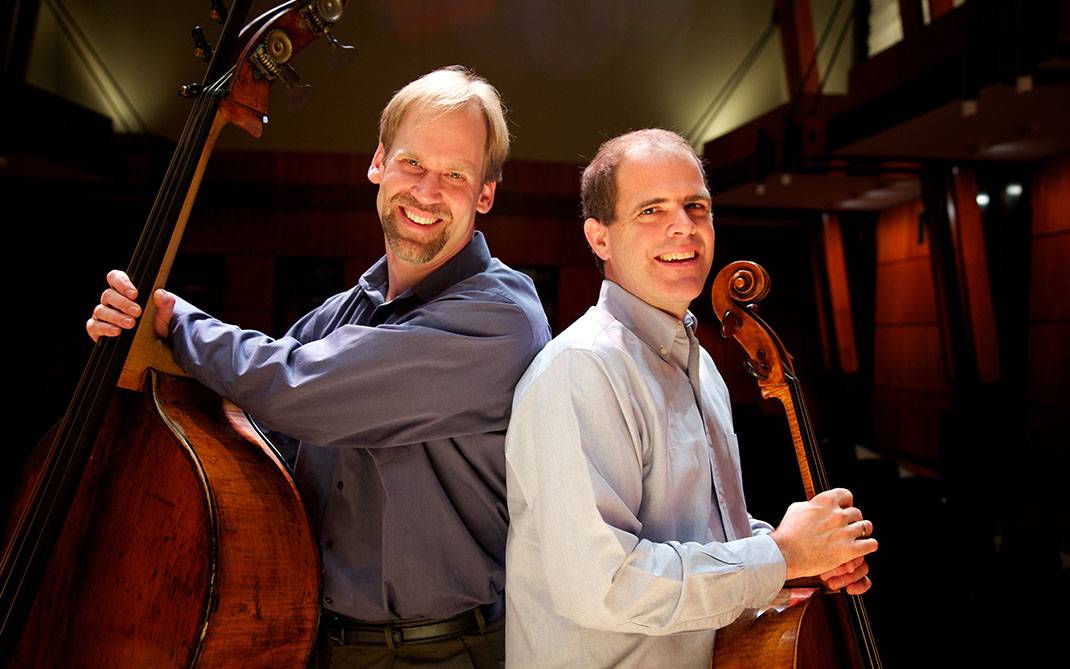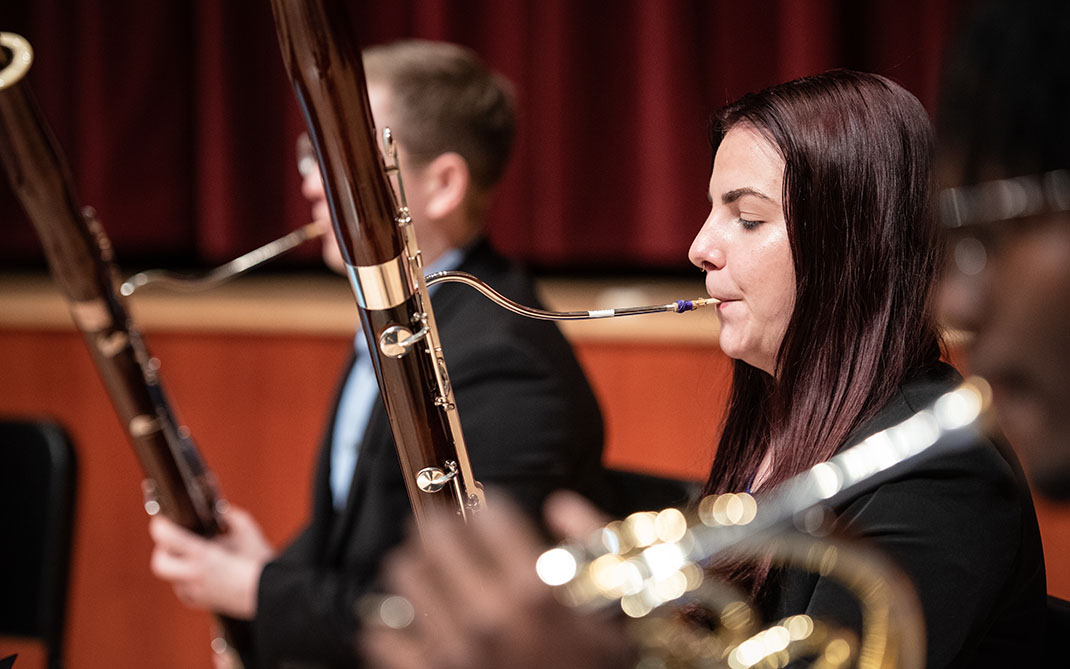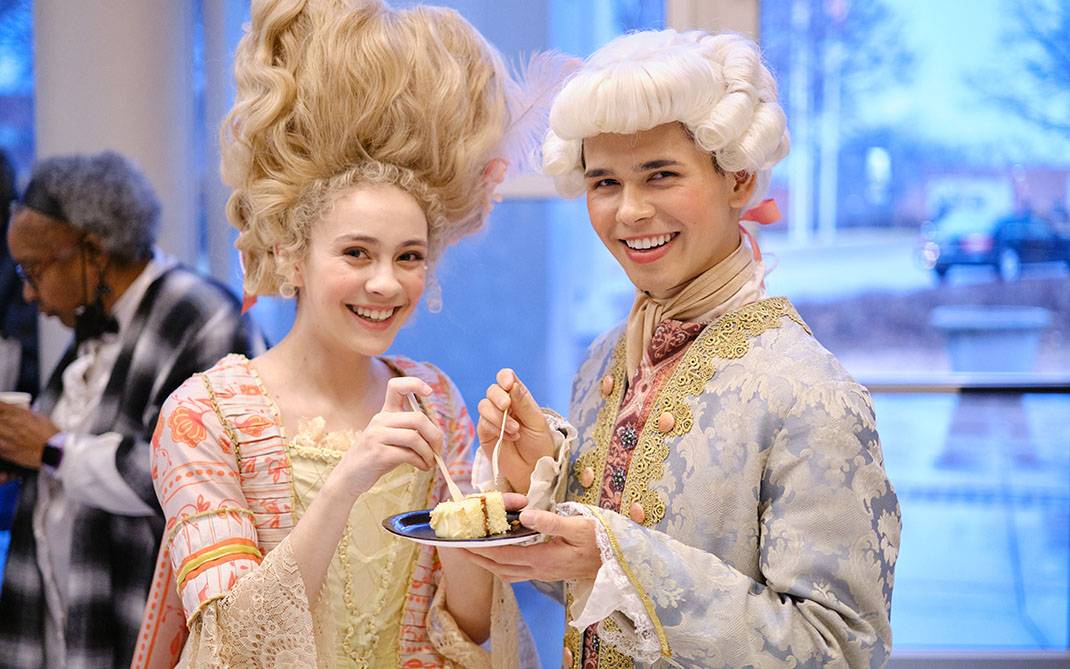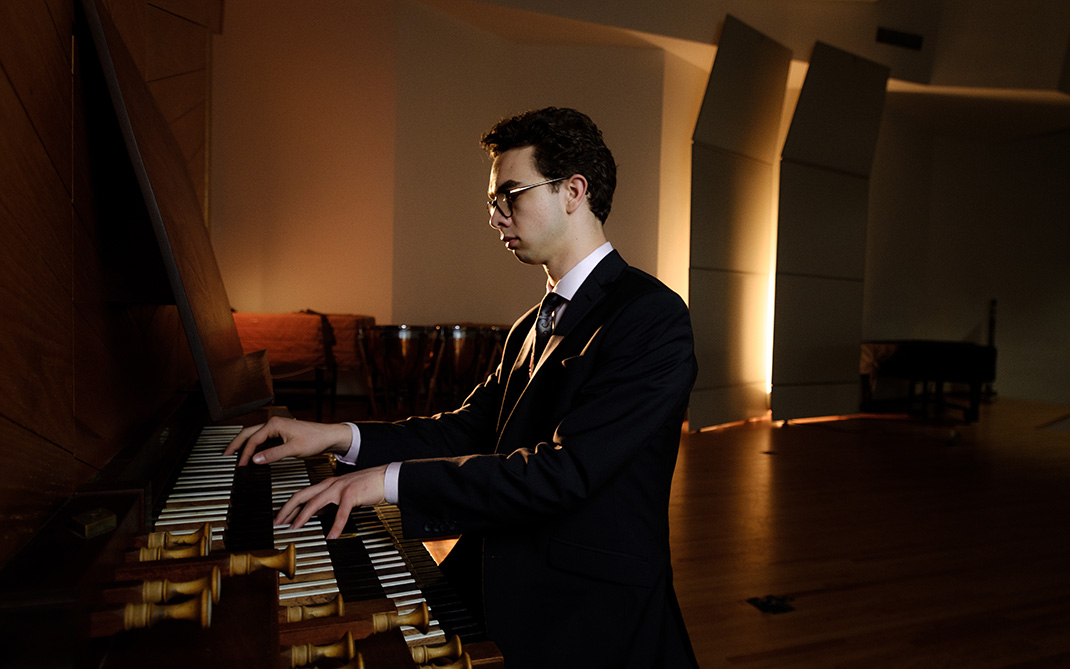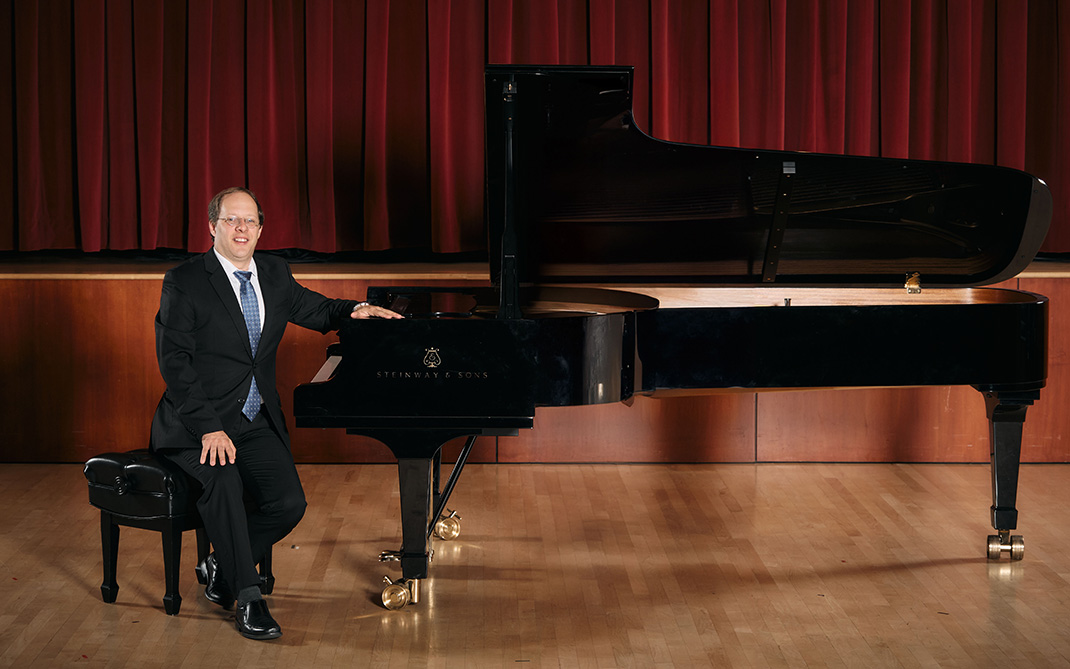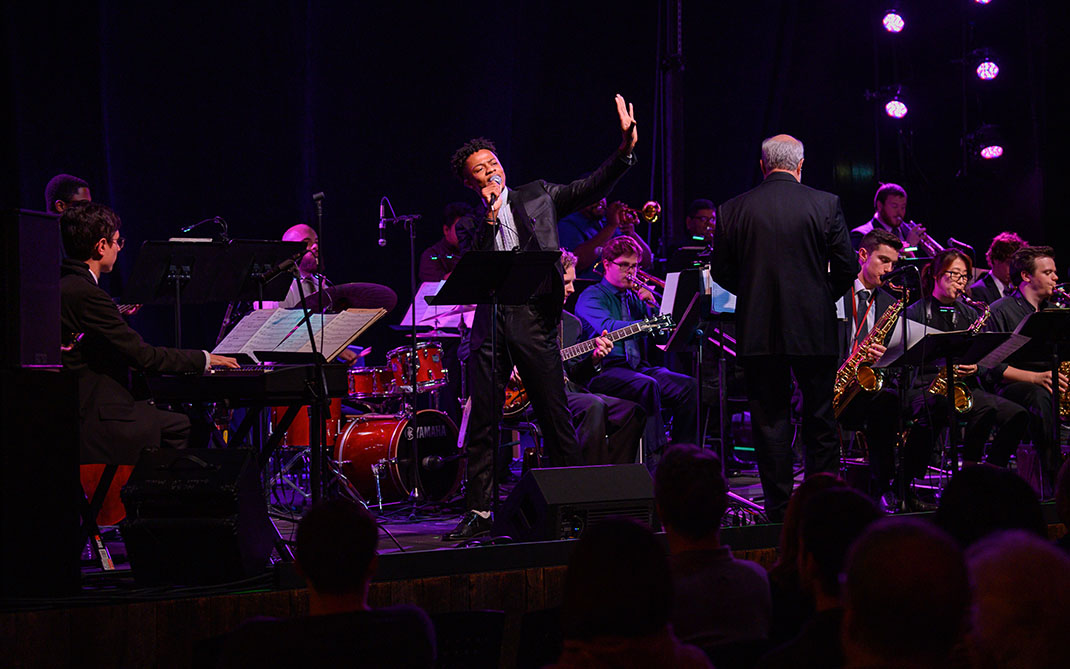Acclaimed baritone, alumnus Joshua Conyers to give recital “Journey: My American Story”
UNCSA welcomes A.J. Fletcher Opera Institute alumnus and guest artist Joshua Conyers, baritone, in recital as part of the 2023-24 performance season. Conyers will tell his story as a Black man and musician in America in a performance titled “Journey: My American Story with Joshua Conyers” at 3 p.m. Sunday, Sept. 24, in Watson Hall on the UNCSA campus, 1533 S. Main St.
The concert will feature works by Black composers such as Shawn E. Okpebholo, Hall Johnson and Florence Price, in addition to works by Samuel Barber, Virgil Thomson and Charles Ives. Collaborative pianist Nancy Johnston will accompany Conyers.

Joshua Conyers / Photo: Arielle Doneson
Tickets are $20 for adults, $15 for non-UNCSA students with valid ID online or by calling the box office at 336-721-1945. The concert will also be available for free via livestream online.
Conyers has been singled out by Opera News for his “deliciously honeyed baritone that would seduce anyone,” by The New York Times as having “a sonorous baritone” that “wheedled and seduced” and by The Washington Post for having a “show-stealing” performance in Jeanine Tesori’s “Blue” at Washington National Opera. Conyers sang the role of Reginald in Anthony Davis’ “X: The Life and Times of Malcolm X” on the Grammy Award-nominated recording in 2022. This year, he will make his Metropolitan Opera debut reprising the role of Reginald in October, and his debut with the New York Philharmonic at Geffen Hall as the bass soloist in Handel’s “Messiah” in December.
Conyers received a Bachelor of Music in 2010 and a Professional Artist Certificate from the Fletcher Opera Institute in 2015, both from the School of Music at UNCSA. Most recently, he joined the faculty of the Eastman School of Music in Rochester, New York, as a full-time assistant professor of voice.
“I’ve been wanting to do a recital series, and I was asking myself what does that look like?” Conyers said. “In 2023, I should be singing something that means something to me. I wanted to tell my story through music, starting at my alma mater.
“When I started singing at 15, I started with the classics – Barber and Ives – with their basis and ancestry in Europe. But I also wanted to add my Black experience, which came later on.”

Joshua Conyers / Photo: Arielle Doneson
Conyers said that he initially resisted singing spirituals and gospel music, because he didn’t want to get pigeonholed as a singer of “only” Black music. Once he had proven himself as a concert singer, he began to honor his ancestors and bring their underrepresented music onto the world stage.
“As I became a professional, I started thinking that these are the songs that my ancestors sang,” he said. “They created these beautiful songs in the harshest times in the world. Now, I’m free to dig into these songs, and to be sure that they are still alive. My ancestors went through all that they did, so I can stand here today and perform this.”
Highlighting Conyers’ program is Grammy-nominated Okpebholo’s “Two Black Churches,” which reflects on tragic events perpetrated by white supremacists at the 16th Street Baptist Church bombing in Birmingham, Alabama, that killed four girls in 1963; and the Mother Emanuel AME Church shooting in Charleston, South Carolina, that killed nine parishioners in 2015.
“I wanted to bring home these sad and traumatic pieces, and then from there I really wanted to showcase pieces that I learned in school and that I absolutely love,” Conyers said.
Also on the program is Charles Ives’ “General Booth Enters Into Heaven.” Booth was the founder of the Salvation Army of which Conyers was a member all through high school.

Joshua Conyers / Photo: Arielle Doneson
“I discovered this piece in graduate school,” Conyers said. “It’s an amazing piece. The working of it includes marches, atonality and melody. It’s an astonishing, very difficult and very fun piece. I had to have it because it accompanies my life. I’ve been wanting to do it for a long time.”
“Dover Beach,” by the poet Matthew Arnold, is set to music by Barber, which reflects America in conflict. “I wanted to go with composers who I really love who are important in our institutions,” Conyers said. “‘Dover Beach’ is a standard piece for baritones. Every baritone has to do it.
“And I’m ending the recital with Florence Price, and with spirituals by Black male composers. I didn’t learn about the Black part of my heritage until I was older. As a Black man, I’m underrepresented in opera, and Black female composers are even less represented.”
Since his appointment as an assistant professor at Eastman, Conyers said that he is determined to shine a light on art songs by Black composers. “Florence Price was one of the most famous composers of her time,” he said. “She wrote some of the most beautiful pieces, and I am so excited to sing them. She writes about the beauty of darkness, about the beauty of the night and the beauty of our Black skin.
“There are a plethora of art songs that are in the repertory by Black composers, and they would benefit singers and listeners alike.”
Conyers said that he will end the concert with spirituals, because they uplifted the enslaved, and they are still uplifting today. “I’m happy to make that choice,” he said. “I have the privilege of doing what I want to do, and showcasing these songs is my great honor. I can sing them out loud and proud for those who worked and struggled so that I can be here today.”
Collaborative pianist Nancy Johnston joined the piano staff of UNCSA in 1983. She holds degrees in vocal coaching and accompanying from Indiana University and the University of Illinois. Johnston is also the principal keyboardist for the Winston-Salem Symphony, the Greensboro Symphony and Piedmont Opera. “Accompanying other musicians and singers is always a balancing act, ”Johnston said “It depends on the music. Sometimes you’re leading, sometimes you’re following, but you are always listening.
“When piano students start accompanying, they often have trouble listening to other people,” she said. “They are so involved in their parts. You have to listen to the other person all the time.”
She specifically requested to accompany Conyers in this recital. “Josh was always a special kid,” she said. “I said, ‘If you get Josh, please let me play for him.’ It’s a challenging program. It’s varied, but it’s all in English. …
“Accompanying is about sharing the music,” Johnston concluded. “You enjoy the music, and you want other people to enjoy the music.”
More about Joshua Conyers
Originally from the Bronx, New York, Conyers has performed in operas throughout the U.S., including at Santa Fe Opera, Lyric Opera of Chicago, Opera Omaha, Detroit Opera, Seattle Opera, Boston Lyric Opera, Atlanta Opera and Aspen Opera Theatre. This past spring, he sang The Reverend in Jeanine Tesori and Tazwell Thompson’s “Blue” at Washington National Opera, which he subsequently covered and sang Policeman 3/Congregant 3 at the English National Opera in London.
As a concert artist, he made his Carnegie Hall debut in 2018 as the baritone soloist in works by Mozart, Beethoven, Vaughan Williams and Mark Hayes, under the baton of Hayes. He also made his debut at The John F. Kennedy Center for the Performing Arts in 2018 as the baritone soloist performing the Duruflé Requiem under the baton of Anton Armstrong. In 2019, Conyers was a soloist with the National Symphony Orchestra, performing with world-renowned Maestro Gianandrea Noseda and singer-songwriter Ben Folds.
Get the best news, performance and alumni stories from UNCSA.
SUBSCRIBE TO OUR NEWSLETTERS(OPENS IN NEW TAB)(OPENS IN NEW TAB)(OPENS IN NEW TAB)(OPENS IN NEW TAB)(OPENS IN NEW TAB)(OPENS IN NEW TAB)(OPENS IN NEW TAB)(OPENS IN NEW TAB)(OPENS IN NEW TAB)(OPENS IN NEW TAB)(OPENS IN NEW TAB)(OPENS IN NEW TAB)(OPENS IN NEW TAB)(OPENS IN NEW TAB)(OPENS IN NEW TAB)(OPENS IN NEW TAB)(OPENS IN NEW TAB)(OPENS IN NEW TAB)
September 08, 2023
